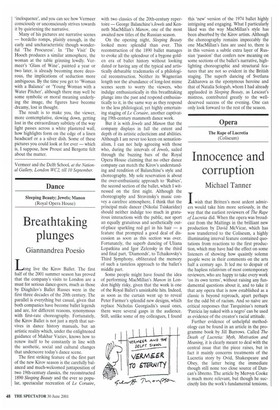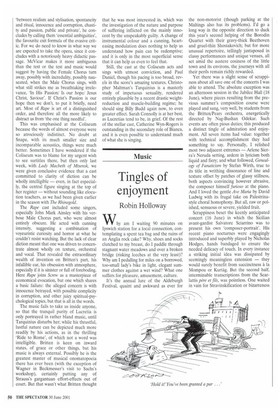Opera
The Rape of Lucretia (Coliseum)
Innocence and corruption
Michael Tanner
Iwish that Britten's most ardent admirers would take him more seriously, in the way that the earliest reviewers of The Rape of Lucretia did. When the opera was broadcast from the Maltings in the brilliant new production by David McVicar, which has now transferred to the Coliseum, a highly illuminating interval feature contained quotations from reactions to the first production, which may have had the effect on some listeners of showing how quaintly solemn people were in their comments on the arts half a century ago. It led me to despair of the hapless relativism of most contemporary reviewers, who are happy to take every work 'on its own terms', without raising any fundamental questions about it, and to take it that any opera that is now established as a classic is beyond reproach, apart perhaps for the odd bit of racism. And so naïve are critical responses that Tarquinius's remark Patricia lay naked with a negro' can be used as evidence of the creator's racial attitude.
Further evidence of unhelpful methodology can be found in an article in the programme book by Jill Burrows. Called The Death of Lucretia: Myth, Motivation and Meaning, it is clearly meant to deal with the central issue that the piece raises, but in fact it mainly concerns treatments of the Lucretia story by Ovid, Shakespeare and Obey, the latter being the immediate though still none too close source of Duncan's libretto. The article by Mervyn Cooke is much more relevant, but though he succinctly lists the work's fundamental tensions,
'between realism and stylisation, spontaneity and ritual, innocence and corruption, chastity and passion, public and private', he concludes by calling them 'essential ambiguities', the favourite exit formula of the evasive critic. For we do need to know in what way we are expected to take the opera, since it concludes with a notoriously heavy didactic passage. McVicar makes it more ambiguous than the text or the text and music would suggest by having the Female Chorus turn away, possibly with incredulity, possibly nauseated, when the Male Chorus sings, with what still strikes me as breathtaking irrelevance, 'In His Passion/ Is our hope/ Jesus Christ, Saviour'. If Christ's Passion is our hope then we don't, to put it briefly, need art. Most of Rape is art of a distinguished order, and therefore all the more likely to distract us from 'the one thing needful'.
This was emphasised at the Coliseum because the words of almost everyone were so atrociously indistinct. No doubt at Snape, with its much smaller size and incomparable acoustics, things were much better. Sometimes I have wondered if the Coliseum was to blame for my urgent wish to see surtitles there, but then only last week, with Lady Macbeth of Mtsensk, we were given conclusive evidence that a cast committed to clarity of diction can be wholly intelligible — even, in fact especially, the central figure singing at the top of her register — without sounding like elocution teachers, as we had been given earlier in the season with The Rhinegold.
The Rape cast included some singers, especially John Mark Ainsley with his verbose Male Chorus part, who were almost entirely obscure. He acted with cunning intensity, suggesting a combination of voyeuristic curiosity and horror at what he couldn't resist watching. But the lack of clear diction meant that one was driven to concentrate almost wholly on texture, orchestral and vocal. That revealed the extraordinary wealth of invention on Britten's part, his infallible ear, his obsession with atmosphere, especially if it is sinister or full of foreboding. Here Rape joins Screw as a masterpiece of economical evocation, but one which shares a basic failure: the alleged concern is with innocence betrayed, with possible complicity in corruption, and other juicy spiritual-psychological topics, but that is all in the words.
The music fails to take us inside anyone, so that the tranquil purity of Lucretia is only portrayed in rather bland music, until Tarquinius disturbs her; while his thrustful, lustful nature can be depicted much more readily by his actions, as in the thrilling 'Ride to Rome', of which not a word was intelligible. Britten is keen on inward states, of grace or other things, but his music is always external. Possibly he is the greatest master of musical onomatopoeia there has ever been (with the exception of Wagner in Beckmesser's visit to Sachs's workshop), certainly putting any of Strauss's gargantuan effort-effects out of court. But that wasn't what Britten thought that he was most interested in, which was the investigation of the nature and purpose of suffering inflicted on the mainly innocent by the unspeakably guilty. A change of instrumental colour and a cunning, hearteasing modulation does nothing to help us understand how pain can be redemptive; and it is only in the most superficial sense that it can help us even to feel that.
Still, the cast at the Coliseum acts and sings with utmost conviction, and Paul Daniel, though his pacing is too broad, revels in the score's amazing textures. Christopher Maltman's Tarquinius is a masterly study of impetuous sexuality, rendered entirely plausible by a recent drastic weightreduction and muscle-building regime; he should sing Billy Budd again now, to even greater effect. Sarah Connolly is at her best, as Lucretias tend to be, in grief. Of the rest of the stellar cast, Catherine Wyn-Rogers is outstanding in the secondary role of Bianca, and it is even possible to understand much of what she is singing.











































































 Previous page
Previous page